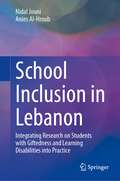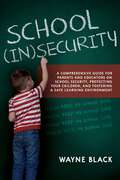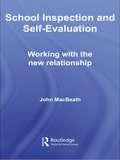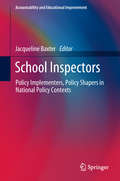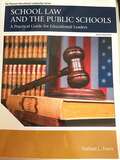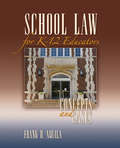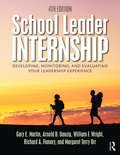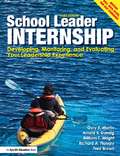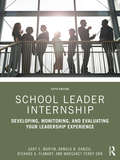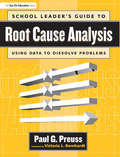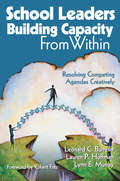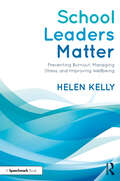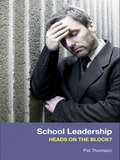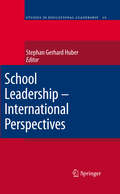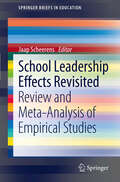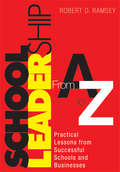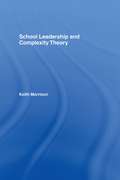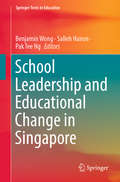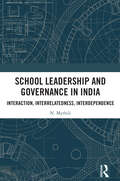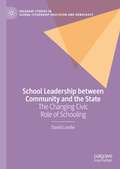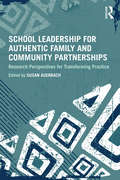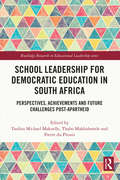- Table View
- List View
School Inclusion in Lebanon: Integrating Research on Students with Giftedness and Learning Disabilities into Practice
by Anies Al-Hroub Nidal JouniThis book addresses the impact of inclusion on the performance of students with and without special needs in Lebanese schools. It examines the performance of regular students to the performance of students with learning disabilities (LD) and gifted students as perceived by them to identify the population that is best served by inclusion. The book investigates three domains affecting student performance in inclusive settings: management and organization. Teaching and learning, and student support and school ethos. In addition, it compares the ways in which these domains affect student performance for each population. In addition, the book presents a detailed description of the inclusive practices that affect student performance and the indicators that contribute most positively to fostering the performance of regular students, gifted students, and students with LD. Finally, it describes the inclusion model applied and proved empirically to affect the positive performance of all student groups as a response to the increasing call for inclusive schooling in Lebanon. Key areas of coverage include: Inclusive education, social justice, and equity in Lebanese schools. Student perceptions of inclusion in Lebanon. Inclusion of gifted learners and students with learning disabilities. Comparison of student performance among different populations in inclusive settings. Domains affecting student performance in inclusive settings. Proposed model of student inclusion in Lebanese schools. School Inclusion in Lebanon is an essential resource for researchers, professionals and policymakers, and graduate students in such interrelated fields as school psychology, inclusive education / educational psychology, and social work.
School Insecurity: A Comprehensive Guide for Parents and Educators on School Security, Protecting Your Children, and Fostering a Safe Learning Environment
by Wayne BlackThe must-have school safety guide for any parent and professional ready to make a changeIs your child safe at school? Who makes the decisions about your child&’s safety and security when you send them off to school each day? What does a truly safe school look like? Does your school have an adequate security plan? How can we prevent the unthinkable? It's time to talk about what the parenting books don't teach you: the unmentionable events that occur in US schools every year and how to try to prevent them with invaluable information. Every time you turn on the news, it seems like there is another active threat on a school in the United States. From Columbine and Uvalde to Parkland and Virginia Tech (to name a few), these unimaginable attacks have brought death, severe injuries and mental trauma upon too many of our country's precious children and teachers. It is 100% certain that another school shooting will occur, yet many people still deny that it could happen at their school. This is a dangerous normalcy bias that puts lives at risk. If it&’s predictable, it&’s preventable. Just when you think it can&’t happen here, it does. In this comprehensive guidebook for parents and professionals, Wayne Black utilizes over forty-five years of security experience in both the private and public sectors to educate you on: Who is responsible for your school&’s safety and security How to talk to the school board and administration about security policy The most effective physical safeguards for preventing an attack How to detect and report observable concerning behavior The role of security and law officers in schools Easy-to-follow pathways for you to push for positive change when and where it is needed plus simple, helpful checklists to quickly assess school safety It&’s time for parents to get involved in their children&’s safety at school. In the words of Lori Alhadeff, a parent who lost her daughter at Parkland and founder of Make Our Schools Safe, &“Your voice is your power.&”
School Inspection & Self-Evaluation: Working with the New Relationship
by John MacbeathWritten for heads and teachers, this forward-thinking book examines exactly what the relationship between inspection and self-evaluation means for schools and explores some of the underpinning issues, featuring examples of best practice from successful schools. It is full of useful advice on topics such as how schools can juggle ongoing self-evaluation with OFSTED’s expectations, how to use web sources to best advantage and what can be learnt from experience to lessen the anxiety in the relationship and make it more of a friendly and formative experience for all parties. Drawing on case studies from primary, secondary and special schools, this all-round overview should be of immediate interest to practitioners while also offering students and aspiring heads and teachers a valuable source of detailed information about the processes of inspection and self-assessment.
School Inspectors: Policy Implementers, Policy Shapers in National Policy Contexts (Accountability and Educational Improvement)
by Jacqueline BaxterThis book examines the role of the inspector within the context of a number of OECD member states and explores the ways in which the inspectors themselves interpret, implement and influence inspection practices and policy. Inspection policy can have various unintended consequences, some of which produce radical discrepancies between the policy intent and its implementation. A number of these discrepancies derive from the way in which the policy is articulated while others derive from the ways in which inspectors interpret and operationalise this policy. This implementation is coloured and conditioned by several factors, including the evidence on which inspectors base their judgements; what counts as evidence in different policy contexts; what counts as valid knowledge in inspection processes; the qualities needed by inspectors working in differing policy contexts and the identities that they adopt in order to successfully carry out their work. The book provides a valuable contribution to our understanding of the politics and practices which colour and shape the legitimacy and operational execution of inspection policy. The work is unique in its focus on the inspectors' role within the implementation of the inspection process-- an element often overlooked in the literature. It also includes two chapters co-written by inspectors, offering unique insights into their life worlds and identities.
School Is Wherever I Am
by Ellie PetersonFrom Ellie Peterson, the author-illustrator of How to Hug A Pufferfish comes a timely new picture book about learning, exploration, and the ever-expanding definition of school.Is school only one place?Are there other classrooms?Different teachers?New Lessons?In this charming, thoughtful picture book, author-illustrator Ellie Peterson explores learning, adventure, and the thousands of the things you can discover outside of a classroom—about the world, about your family, about yourself. Because school is truly wherever you are.
School Knowledge for the Masses: World Models and National Primary Curricular Categories in the Twentieth Century (Routledge Library Editions: Sociology of Education #36)
by John W. Meyer David Kamens Aaron BenavotFirst published in 1992, this book presents unique quantitative data on the content coverage of primary education in a large number of countries since 1920. It demonstrates that these curricular outlines tend to be surprisingly similar across very disparate countries, and suggests the world processes that produced this result. Specifically, the study shows that the contemporary primary curriculum dates from changes in the late nineteenth century; that there has been a general shift towards a ‘social studies’ subject; that instruction in mathematics and sciences has tended to expand; that there have been substantial increases in foreign language instruction (and changes in the languages taught); and that instruction in the arts and physical education come to the standard world education model much later than other subjects. This work will be of particular interest to those studying primary curriculum, international education and the sociology of education.
School Law and the Public Schools: A Practical Guide for Educational Leaders
by Nathan EssexAn essential, practical, hands-on resource for school leaders, policymakers, and other educational personnel, this practical, clear, and easy-to-understand guide looks at both the historical background and the contemporary legal issues that affect virtually every aspect of schools today. The new Sixth Edition of School Law and the Public Schools by Nathan Essex brings readers the latest information on today’s most critical issues, among them: recent rulings on religion in public schools, social media, Facebook and Twitter challenges, virtual charter schools, administrators’ authority at bus stops, legal aspects of teachers and administrators’ evaluation, teacher performance and misconduct, 504 Rehabilitation plans, the McKinney-Vento Homeless Act, violence and tragedy in U.S. schools, procedures for evaluating and responding to threats, natural disasters and school safety, proposed changes to No Child Left Behind by the White House, and the use of chaperones for field trips. Numerous application exercises and case studies give the concepts real-life meaning, and illustrative tables and figures further reinforce and amplify the ideas.
School Law for K-12 Educators: Concepts and Cases
by Dr Frank D. AquilaA practical, user-friendly approach to school law supported by carefully constructed information that is of immediate interest to classroom teachers, supervisors and school administrators.Key FeaturesMaps out the court's decision-making process in an easy-to-understand format Illustrates the key aspects of a legal issue through case-studies in every chapterExplains complex cases with succinct case briefs that target legal laypersons and comprehensive chapter overviews that highlight important concepts Encourages dialogue with accompanying discussion questions for each case brief and case studyOffers additional case briefs online at www.sagepub.com/aquilacasebriefs Intended Audience: This book is designed for upper-level undergraduate and graduate students of school law and is a valuable resource for courses in school administration, supervision, and teacher education. "I find this book to be a very well done, comprehensive text, with useful activities and exceptional case briefs" —Dr. Christine Villani, Southern Connecticut State University"More than a comprehensive text, this is a reference work for any active school administrator. School Law for K–12 Educators will be found open on a desk more often than closed on the shelf." —Philip Huckins, New England College "The greatest strength is presentation of facts, narratives, cases, in a concise format with discussion questions and topics" —Audrey M. Clarke, California State University, Northridge"This comprehensive resource is thoughtfully designed with a focus on legal currency and relevancy. The case briefs enhance an already distinctive textbook." —Bradley Vance Balch, Indiana State University"Well done book, comprehensive, and easy to read for educators. The most exceptional portion of this book are the case studies, and the exceptionally well done case briefs, excellent instructional tools." —Dr. Christine Villani, Southern Connecticut State University
School Leader Internship: Developing, Monitoring, and Evaluating Your Leadership Experience
by Arnold B. Danzig Margaret Terry Orr Gary E. Martin Richard A. Flanary William F. WrightSchool Leader Internship, 4th Edition challenges school leader interns to build competencies in 52 leadership skill areas. This unique resource provides step-by-step guidance for interns, their supervisors, and their faculty on how to initiate an internship and evaluate interns' work. In this updated fourth edition, the content is organized around the latest National Policy Board for Educational Administration (NPBEA) Professional Standards for Educational Leaders (2015) and includes intern activities to develop skills in cross-content literacy, distributive leadership, equity in practice, professional learning communities, remediation strategies, school improvement planning, and special populations. This is a critical resource for leadership preparation programs nationwide and the thousands of school districts that support leadership candidates. Special Features include: Beyond the Standards provide further independent practice, reflection, and development for students in the areas of action research, ethical and critical reasoning, dispositions and interpersonal skills, new technologies, school partnerships, and social justice. Self, Peer, and Superior Assessments help students to plan according to individual need, experience, and goals. Internship Plans allow students to assess, analyze, and prepare draft internship plans. Interview Suggestions help students develop a network and gain insight into administrative and curricular responsibility. Professional Development Activities encourage students to analyze and evaluate their experiences and plan for the future. Projects allow students to synthesize their skills.
School Leader Internship: Developing, Monitoring, and Evaluating Your Leadership Experience
by Arnold B. Danzig Gary E. Martin Richard A. Flanary William F. WrightSchool leadership internships are the bridge between classroom teachers and first-time leadership positions. Research shows that quality internships are equally as important as the graduate programs themselves in establishing leadership practices that improve teaching, learning, and school conditions. This book was written as a stand-alone graduate textbook and serves as a guide and support for creating and managing quality school leader internship programs. It provides step-by-step guidance for interns, their supervisors, and their faculty on how to initiate an internship and evaluate interns' work. In this updated third edition, the authors have aligned the internship to the revised ISLLC standards, making this book critical for the over 500 leadership preparation programs nationwide and the thousands of school districts that support leadership candidates.
School Leader Internship: Developing, Monitoring, and Evaluating Your Leadership Experience
by Arnold B. Danzig Margaret Terry Orr Gary E. Martin Richard A. FlanarySchool Leader Internship, 5th Edition, challenges aspiring educational leaders and interns to better assess, prepare, plan, implement, and evaluate their internship experience in preparation for certification, licensure, and advancement into school building-level leadership positions. In this updated edition, the content is organized around the latest National Education Leadership Preparation (NELP) Standards and includes intern activities that develop skills in essential areas including ethics, equity and cultural responsiveness, curriculum development, community of care, support of teachers and staff, school partnerships, and continuous school improvement. This unique book provides step-by-step guidance for interns, their supervisors, and faculty on how to initiate an internship and evaluate interns' work and is a critical resource for leadership preparation programs nationwide and the thousands of school districts that support leadership candidates. Special Features: The National Education Leadership Preparation (NELP) Standards Assessment provides an understanding of the wide breadth of experience and demonstration of skills necessary for school leaders. Self and Superior Assessment helps students to plan according to individual need, experience, goals, and performance expectations. Internship Plans allow students to assess, analyze, and prepare draft individualized internship plans. Professional Report or Portfolio encourages students to evaluate and reflect on their experiences and plan for the future.
School Leader's Guide to Root Cause Analysis: Using Data To Dissolve Problems
by Paul PreussDon’t jump from problem to solution without first investigating root causes. This book helps you more accurately focus on school improvement issues, so you can avoid wasting precious time and resources. It is clearly written, contains lots of real examples, and is presented in a style and format designed for the non-expert. It will help you make decisions which will improve learning for all students.
School Leaders Building Capacity From Within: Resolving Competing Agendas Creatively
by Dr Leonard C. Burrello Dr Lauren Hoffman Dr Lynn MurrayBe the architect for your school's long-lasting, positive transformation using proven "Structural Dynamics" strategies outlined in this indispensable guide.
School Leaders Matter: Preventing Burnout, Managing Stress, and Improving Wellbeing
by Helen KellyThis book outlines practical steps that both government and schools can implement to significantly reduce the demands placed upon school leaders. It also provides highly effective tools and strategies to enable school leaders to reflect upon and improve their own wellbeing. Packed full of research-led approaches this book: Examines school leader burnout, what causes it, how to recognise it, and how to prevent it Reflects on why school leaders fail to prioritise their own needs and how this can be addressed Provides a comprehensive framework for schools to support leader thriving and resilience Shares effective, evidence-based coping strategies for leaders. This is a must-read book for all school leaders and those looking to support and improve school leader wellbeing.
School Leadership - Heads on the Block?
by Pat ThomsonMost teachers become heads for idealistic reasons, wanting to make a difference to the lives of children and young people. Yet serving heads suggest the job is getting harder, talking openly about stress and leaving the job. Many teachers now see headship as a risky business, and succession planning, while necessary, will not on its own be sufficient to attract the diverse range of applicants required to satisfactorily fill leadership positions. School Leadership: Heads on the Block addresses this shortage. It suggests there is no crisis in supply per se, but that schools in some locations find it difficult to attract the ‘right people with the right stuff’. The book examines the expectations of heads, the hours they are expected to work and the nature of everyday demands. It proposes that ‘sudden death’ accountabilities act as a major disincentive to potential applicants, and outlines a series of policy measures to tackle the kinds of daily pressures heads now experience. Key features of the book: draws on a wide range of material, ranging from published research, interviews and media clippings to popular films and children’s novels makes extensive use of headteachers’ words and stories based in the author’s own experiences of headship, tackling issues that leadership books often ignore. The book will be of interest to headteachers, headteachers’ professional associations, teachers and those who study teaching. It will be useful to policy makers, those responsible for the education of potential heads and for headteacher professional development.
School Leadership - International Perspectives
by Stephan HuberRecent research into school effectiveness has corroborated the theory that the school leader plays a pivotal role making their school a successful institution, and is most often cited as the key factor in a school's development. Reflecting the importance it is given in the today's education landscape, this book explores the latest trends in school leadership from both theoretical and practical perspectives. Each chapter provides insight into an aspect of current research, with detailed case studies coming from as far afield as Hong Kong and Canada. In the context of the ever-increasing burden of responsibility placed on education management to safeguard and enhance the quality of education they provide, school leadership is now a core concern of policy makers. In addition, most countries are undertaking fundamental education reforms that will have a major influence on the nature of school leadership. Offering the most up-to-date research on this central issue, this book will both inform and shape the debate.
School Leadership Effects Revisited
by Jaap ScheerensThis highly detailed study maps four decades of evolution of the concept of what constitutes effective school leadership. It analyses the theoretical background to these developments and advocates the utility of thinking of a 'lean' form of school leadership that is comparable to the concept of 'meta-control'. A wide-ranging survey of the empirical research literature on leadership effects includes the presentation of results from earlier meta-analyses as well as a new meta-analysis on some 25 studies carried out between 2005 and 2010. This survey demonstrates that older reviews and meta-analyses were predominantly based on so-called 'direct effect' studies, while more recent studies have tried to quantify the indirect effects of leadership, mediated by other school variables. While acknowledging the relatively small total effect of leadership on student outcomes, the study does identify promising intermediary factors which, stimulated by specific leadership behaviours, impact on student performance. The book ends by drawing out wider implications for educational practice and policy, presented under headings such as 'schools need leadership', 'the toolkit of the school leader as a meta-controller', 'the special case of turning around failing schools' and 'efficiency of school leadership'. In passing, the authors make several suggestions about potentially fruitful next steps in researching the effects of school leadership.
School Leadership From A to Z: Practical Lessons from Successful Schools and Businesses
by Robert D. RamseyUsing a fresh approach to leadership, this resource blends proven traditional success secrets for school leaders with newfound strategies and unique methods from businesses and organizations outside the education community.
School Leadership and Administration: The Cultural Context (Reference Books in International Education)
by Allan Walker Clive DimmockThis text calls for a broader approach to comparative educational administration: one which uses culture as the principle means of analysis. The articles collected by Allan Walker and Clive Dimmock detail the educational practices and outcomes of other systems while taking into account the mediating influence of culture. In this way, these essays stress the specific aspects of the cultures studied, and map out common ground for the study of administrators' values, beliefs, and actions.
School Leadership and Complexity Theory
by Keith MorrisonInterest in complexity theory, a relation of chaos theory, has become well established in the business community in recent years. Complexity theory argues that systems are complex interactions of many parts which cannot be predicted by accepted linear equations. In this book, Keith Morrison introduces complexity theory to the world of education, drawing out its implications for school leadership.He suggests that schools are complex, nonlinear and unpredictable systems, and that this impacts significantly within them. As schools race to keep up with change and innovation, he suggests that it is possible to find order without control and to lead without coercion. Key areas:* schools and self-organisation* leadership for self-organisation* supporting emergence through the learning organisation* schools and their environments* communication* fitness landscapesThis book will be of interest to headteachers and middle managers, and those on higher level courses in educational leadership and management.
School Leadership and Educational Change in Singapore (Springer Texts in Education)
by Benjamin Wong Pak Tee Ng Salleh HaironThis book provides readers with insights into how Singapore school leaders are actively engaged in the transformation of the Singapore education system. It brings to attention crucial elucidations of the increasing demand and complexity placed on school leaders through the use of case studies. Each chapter in the book focuses on a particular issue which has become important or has gained renewed importance in the Singapore education system. The chapters first provide a background to the theme under examination and a theoretical basis for discussion. They then narrate the case that shows how school leaders interpret and implement policy initiatives in their respective schools or lead change in that area. The case studies span over a wide range of domains such as instructional leadership, assessment leadership, stakeholder engagement, professional learning communities, and school branding. The data collected from these case studies came primarily from interviews of educators in their respective school contexts, in addition to other sources of data such as artifacts. Each case study highlights descriptions, interpretations, and perspectives across school contexts, which is consistent with the proposition that school leadership is very much shaped by context. At the end of each chapter, there are guiding questions to help readers critically analyse and reflect on the main learning points of the case.
School Leadership and Governance in India: Interaction, Interrelatedness, Interdependence
by N. MythiliThis book explores school processes that shape student learning and principals’ leadership. It uses an interdisciplinary approach by applying the complexity governance and leadership theories drawn from public administration and leadership discourse in education. The strength of this book lies in identifying the latent processes that determine governance and leadership using interaction, inter-relatedness and interdependence through explanation building used in advanced qualitative analysis which hitherto rarely used in education. For this purpose, it first draws organised data developed as leadership function-behaviour interaction in the book School leadership in India: Styles, functions, behaviours and practices written by the same author and published by Routledge in 2025. Another important feature of the volume is how it applies robust theories drawing from public administration and educational leadership using an interdisciplinary approach that was rare to find in studying school governance and leadership.This book will be of interest to researchers, academicians working in the area of educational leadership and management, school and teacher education in universities, research institutes, think-tanks working on education policy, good governance and public policy in general. It is also relevant in management institutes, public administration, development studies and public policy in universities.
School Leadership between Community and the State: The Changing Civic Role of Schooling (Palgrave Studies in Global Citizenship Education and Democracy)
by David LundieThis book presents changes in UK and global educational governance in the context of a radical shift in the operating logics of politics and its interaction with education. Beginning from the colonial origins of political interest in education, the author traces a fundamental shift in the patterns of governance of schools in England in the opening decades of the 21st century. Operating through the logics of public choice economics involving both real markets and quasi-markets, policy reforms have increasingly framed school values, and the value of schooling, in line with a politically determined and nostalgic discourse of ‘British values’. This stands in contrast to a previous focus on ‘community cohesion’ which foregrounded school partnership with the parent community and wider society. Tracing the processes and mid-level actors mediating between government and school leaders, the author identifies processes of recontextualisation through which policy can be reinscribed and resisted.
School Leadership for Authentic Family and Community Partnerships: Research Perspectives for Transforming Practice
by Susan AuerbachSchool leaders are increasingly called upon to pursue meaningful partnerships with families and community groups, yet many leaders are unprepared to meet the challenges of partnerships, to cross cultural boundaries, or to be accountable to the community. Alliances are needed among educators, families, and community groups that value relationship building, dialogue, and power-sharing as part of socially just, democratic schools. This book brings together research perspectives that intersect the fields of leadership and partnerships to inform and inspire more authentic collaboration. Contributors from the fields of educational leadership, family engagement, school-community partnerships, and education for social justice come together to examine the role of educational leaders in promoting partnerships as a dimension of leadership for social justice. The volume offers a mix of empirical, conceptual, and reflective chapters with research representing qualitative, quantitative, and mixed methods approaches in urban, suburban, and rural schools. The chapter, "Conversations with Community-Oriented Leaders," includes candid advice from district and school-level administrators on this under-documented aspect of leadership. Situating leadership for partnerships within the leadership literature, this book proposes a model for addressing tensions embedded in home-school relations and leading schools toward more authentic relationships with stakeholders. This collection of original scholarly articles will be a unique resource for new and aspiring administrators and for researchers in both the fields of leadership and school-family-community partnerships.
School Leadership for Democratic Education in South Africa: Perspectives, Achievements and Future Challenges Post-Apartheid (Routledge Research in Educational Leadership)
by Tsediso Michael Makoelle Thabo Makhalemele Pierre Du PlessisSchool Leadership for Democratic Education in South Africa explores the democratization and modernization of education in South Africa, analyzing the state of school leadership in South African schools from the time of the new democratic education dispensation in 1994 to the present day. The book maps out what the future of education in South Africa could look like and explores the most conducive educational environments for change in South African schools. It adopts a critical approach to analyzing leadership and management in the context of school governance, school effectiveness, teacher development, multiculturalism and equity in education. Contributions explore the democratization and modernization of education in South Africa through examining different perspectives, achievements and challenges, and also consider issues around access to technology, language policy and the curriculum along with new literature on selected aspects of leadership. This book will be of great interest for researchers, scholars, and students in the fields of educational leadership, sociology of education, and teacher education.
